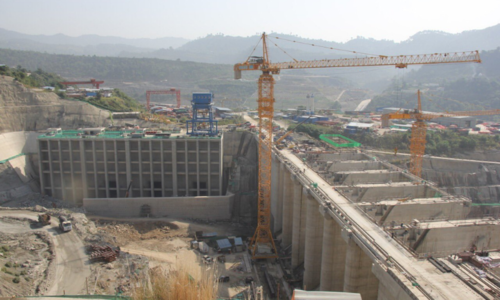ISLAMABAD: Planning and Development Minister Asad Umar on Friday said security threats had increased in the country because of opposition by international powers to the China-Pakistan Economic Corridor (CPEC) and the latest situation in Afghanistan.
“Security threat is elevated,” he said in response to a question at a hurriedly called news conference, adding that no doubt development on CPEC was looked upon with aversion by big global powers who wanted to sow dissension in the country. The challenges are also there because of the uncertain Afghan situation. “So there are not only security challenges, but these are at an elevated level,” he said.
However, Mr Umar said, the entire leadership led by the prime minister and also including the army chief and other security high-ups had taken effective steps that had also been shared with the Chinese leadership who had expressed confidence in the additional security arrangements.
Minister asks politicians to be careful while commenting on corridor projects
In such situations politicians ought to be careful while commenting on CPEC, he said, adding that there was no bar on criticism and recommendations but it should not be described like “closed down, finished or destroyed”.
The minister was referring to the observations by chairman of the Senate Standing Committee on Planning Salim Mandviwala who recently said the Chinese ambassador and companies had complained about slow pace of work on CPEC projects.
Without naming Mr Mandviwala, the minister said he was a seasoned person and could not be expected of speaking irresponsibly but perhaps he had been misled. He said he expected that the Chinese embassy would also be issuing something explanatory to the media.
Mr Umar rejected a perception that CPEC had been slowed down over the past three years and claimed the major work on the corridor projects had been completed during the tenure of the current PTI government.
In the first phase of CPEC, power and infrastructure were the two major sectors of focus and power projects of 3340MW were completed by the previous government, while 5864MW projects were being completed by the current government. On top, work on another 1824MW projects had also been started recently and these would be completed after the tenure of the current government.
In infrastructure and road sector, the minister said, the PML-N government had completed 394km-long motorways and highways under CPEC, while the current government had so far completed 413km of motorways and highways.
He said the PML-N government had totally ignored the western corridor that was at the heart of CPEC. He said Gwadar-Hoshab road was completed by the previous government which had also initiated Hakla-D.I. Khan motorway and completed 42 per cent of work, while the rest of 56pc was completed by the current government. Other than these two projects, the previous government could not take to initial approval stage any of the road projects on the western alignment.
The planning minister said the D.I. Khan-Zhob road (210km) project had been approved and a loan application submitted while negotiations for the loan were in process. Similarly, the contractor of the Zhob-Quetta road project had been mobilised and PC-1 of Quetta-Khuzdar road approved, while funding for this project had already been allocated in the Public Sector Development Programme (PSDP) 2021-22.
Mr Umar said the current government had completed 67pc work on 10km Khuzda-Basima road and would soon complete the rest of work. Likewise, he said, the 146km Hoshab-Awaran road project had also been approved and the contractor had been mobilised. The project is an integral part of the CPEC central alignment that connects the port city of Gwadar with Sindh.
“In fact, real work on western corridor of CPEC has been started by our [PTI] government,” he said, adding that instead of waiting for the Chinese loans the government has started work on the projects from its own resources under the PSDP.
Moreover, the government is also starting work on the connecting roads to the western alignment. The Peshawar-D.I. Khan motorway project is one of such projects which has recently been approved. Similarly, the 460km Karachi-Quetta-Chaman road project has also been approved and one of the portions will be completed by the government itself while the other sections would be constructed under the public-private partnership.
Likewise, the government has also accorded approval to other such projects such as Nokundi-Mashkel road, Mashkel-Panjgur road and Awaran-Jhal Jhao road. The minister said these connecting roads and the western alignment were being built to take maximum benefit of the opportunities to be open up in Afghanistan after peace and stability prevailed there.
Asad Umar said that after completion of the first phase, “we are entering the second but very important phase of CPEC under which investment would come to a range of sectors, including industrialisation, agriculture, livestock, science and technology and other social sector development sectors”. He said the present government had also taken three industrial zones to operational stage.
Published in Dawn, September 18th, 2021




































